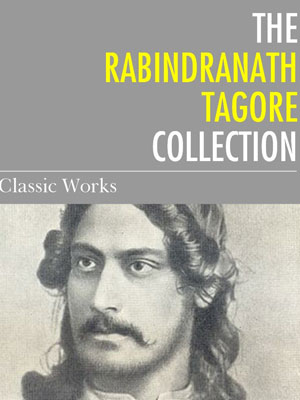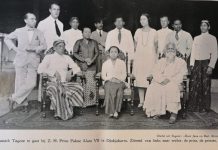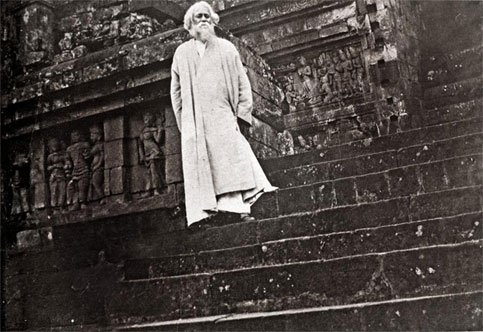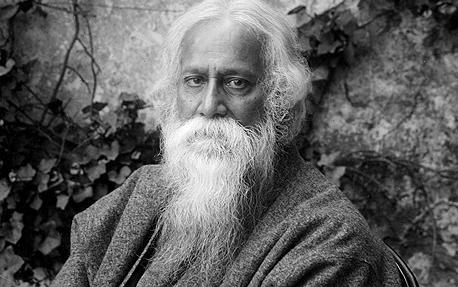35. Poem: Jogin-da (Jogin the big brother) of the book ‘Chharar Chhabi‘ (Pictures in Rhyme) written in 1937, 4 years before the death of the Poet.
[Translator’s note – In our childhood our hot favourite was ‘Thakurmar Jhuli’ (=The Granny’s Bag), a book of tales by Dakshinaranjan Majumdar. Dakshinaranjan had picked up the stories hot from the Grannies’ mouths as they would tell their grandchildren at bedtime in rural Bengal of yore. The stories comprised King, Queen, Prince, Princess, other royalties, commoners like woodcutters, weavers, hermits etc. along with demons, ghosts, flying horse, chariots, peacock boats etc. with boundary between reality and fantasy lost, or rather rendered irrelevant, manifesting various human weal and woe, strife, impediments to achieve life’s ambition etc. which would hypnotize children, the audience to these from their grannies/elders, and for the latter these stories were unfailing to tame the kids and glue them to the bed when it would be time for it. This book was fore worded by Rabindranath Tagore and only he could pen such a superb foreword. As Tagore wrote, initially he had a lot of apprehension about the scripts produced before him by Dakshinaranjan as he had taken up a difficult task of capturing a fugitive treasure from our life that so much nourished the imagination of the children of Bengal which is being gradually left dry of what was possibly the best gift of their childhood with a blend of their elders’ affection (irreplaceable by the modern ‘idiot box’ packages). But Tagore gave Dakshnaranjan his unreserved compliment having performed this difficult task so well. He concluded his foreword with the proposal of launching an institution based on Dakshinaranjan’s ‘Thakutmar Jhuli’ for training of the modern grannies in story telling to their sibling kids.
In the olden days story tellers abounded Bengal though they are now an effaced specie. I am inclined to believe that ‘Joginda’ is a first hand experience of the Poet in his childhood and not merely his imagination. Tagore himself was a great story teller and even in the form of a poetry as may be seen here. This story is also an example how amusing and enjoyable an inconsistent story, bordering rigmarole, can be. This is another dimension of the Poet’s boundless talent which never rejected the lighter aspects of life amidst his engrossment with those profoundest, particularly towards the end of his life when he wrote Jogin-da.]
Born at Dehra-Ismail-Khan
Jogin-da had traveled many a town western,
And villages too on survey work,
While in military service stark.
At last settled among the children
While by sheer age he was olden.
“I’ll endure not your torture”
Aloud daily he would declare.
The very next day he would look for
Those very lads and lasses at his door
And call out, “where’s Tunu and Khonki,
Hey Bhaju, a wild monkey”.
At his voice formidable
The locale would tremble,
Only around him to get
The greedy children to satiate“
Some with marble, some with picture
Or lozenge as one would fervour
Those were mere bribe
At his court their attendance to subscribe.
If Kajli would grieve without reason,
A sweet Pan (1) in her mouth he’d slip in. (1)
Many a granddaughter he had
Or so they were he’d fad“
Like Pagli, Patli and Janguli“
Some to get him Khayer (2), some Kasundi (2) (2)
Or home made lemon drink,
By their mothers, that with his taste would link.
Till then with physique robust,
At sixty plus his youth did last
Smile on his lips, eyes bright
The face a ripe mango, age didn’t blight
Wide forehead, hair thin,
The moustache, his renown had been.
As the day would be over,
The lamp on the stand would flicker
At the road’s turn, the Gardner
Would hawk aloud garlands of flower.
At his face we would stare
With our docile behaviour.
The evening, the bell would greet
Ringing at the temple of the street.
In those days, the evenings
Were true ones, to-day it seems
Then was not invented the electric
The daylight to mimic.
At the corners of the room
The darkness would loom
Amidst that faint light
In tales our minds would flight.
As a story he’d begin to mint
We’d allow him no stint
True or false whatever pleased he,
Would cook up however flimsy.
Even geography
Would go topsy-turvy
Funny it was nevertheless
Though devoid of base.
I give a story below
With my ability low
To do in his style
With many a hue all to beguile.
Past Hosierpur the Chhandousi bound train
Left Sarhora at half past one again.
At dawn sped past
Bundelsor and Amlorisarsar pretty fast.
By the time it arrived Firozabad,
Jogindada’s appetite was well bud
So popping in his mouth fast
Pakouri (3) and hot gram with gust (3)
When the King of Jounpur appeared
With many a bodyguard
Attendant and elephant herd
A big parasol upon him held“
At once on Dada’s head
The minister put a crown and did implore,
“Prince, how long Motimahal you’ll abjure,
Do come back, restore our heart”“
And the bugles and drums played up in concert.
The matter was like this“
For thirteen years the prince was amiss
Absconding the palace
Soon after his wedding took place
As at Nathdoara forest
He went on prey’s quest
No more found since then
Queen Mother’s tears in vain
Rolled down to turn her blind
As the royal agents failed him to find
On their wild goose chase
With only rumours as their base.
To Pindidadankhana, Lalamusa they had been
Also Ludhiana and Punjab but yet to be seen
Guljarpur, to be combed later
While visit to Rawalpindi was to their despair.
The antecedent- Jogindada at Hatras junction
With tea, bread munches on.
Quite well did he dine
While breeze from the field was fine.
Suddenly a Jounpur spy
With folded hands and respect high
Asks, “where’s your home Your Highness!”
Dada thought the honour splendid, and no less
So, better his identity he’d suppress
And only the spy to impress
By his behaviour
That he was the Prince of the empire“
And, with royal signs so many“
God! The spy had never seen in the body of any!
Five months passed thereafter,
Message went to Jounpur of their lost treasure.
In the station Dada was relaxed quite
Till the mystery took height“
While a Gurkha infantry saluted him“
That a guard of honour he did deem.
And the station thronged with Sikhs and Afgans
Escorting him to Itarsy or so with slogans
In his glory in Urdu and Persian,
There from to Mainpuri then Lachmonjhola was their sojourn,
With Sehnai (4) played all the way, on palanquin magnificent (4)
Shouldered by ten bearers with twenty five more contingent.
At Bhatinda stinted for a look,
To the South spotted Dada Vindhya (5) by fluke. (5)
Right there they served drink of green mango,
Reached Jounpur when the afternoon Sun was low.
Here, at the threshold of coronation
Jogindada put his brake on.
With his laugh evasive, said“
“In the process to my gram popping they put paid
Alas brothers! And that’s all I’ve to tell”
“That won’t do! Won’t!” the boys in a babel
Said, “Finish you must!”
And thus Joginda cut it fast.
Said he, “Lucky it didn’t finish,
So I’m still alive as I did wish.
In three days I was through“
A Prince, if you just knew
What it is to be! Daily
To eat Parathas (6) soaked with Ghee (7) (6) & (7)
How can endure that a timid Bengali?
The shining Nagra (8) bruises the feet, (8)
The turban a porter’s load indeed“
It’s no joke to bear with these
So, only to escape these I did please.
Further, on hearing the Prince’s Hindi (9) (9)
None as Hindi they suspected it to be.
On the day of Ramlila (10) festival holy (10)
Far in the town performed ecstatically,
The slack guard brought fortune“
As for escape the moment was opportune.
And this Bengali
In a marathon run did flee
Straight to Bengal and that very night
To Dacca took his flight.
And the spy did earn Rupees ten thousand
Though with his ears boxed, at the end
Had to refund the whole sum
As the rumour to Dada did come.
“Why did you return!” we shout
Jogindada smiles a bit to end the rout.
And half the night as we retired to bed,
The towns he’d named muddled our head.
If I forget the country’s all address,
I’ll reminisce Joginda’s tale with geographic mess.
Notes:
(1) Pan- beetle leaf with spice which is often an addiction with the Bengalis.
(2) Khayer- is an input spice for Pan while Kasundi is a tasty sauce made of mustard.
(3) Pakouri- a fried snack made of pulses and flour.
(4) Shenai- A type of flute played in various festivals like wedding etc
(5) A mountain range.
(6) Paratha- made of flour in disk shape, generally quite heavy.
(7) Ghee- Indian buffalo milk butter.
(8) Nagra- A gorgeous footwear for the royal persons.
(9) Hindi- The common language of North India. Bengalis are ill at ease with Hindi and they are laughing stock in North India for the funny way they speak this language.
(10) Ramlila- A widely performed festival of North India with grandeur.
at Saturday, January 17, 2009 Links to this post Posted by Dr.N.D. Batra 0 comments
Topics Culture: Tagore





